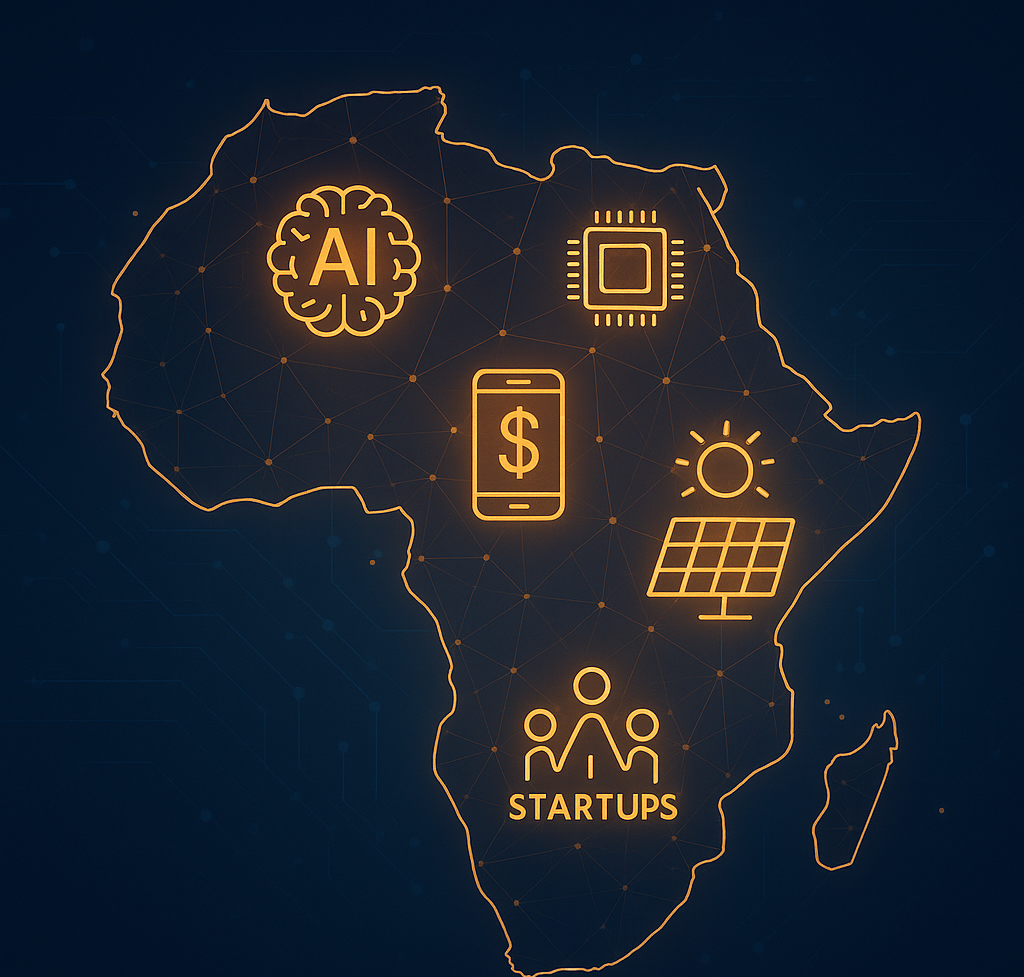Africa’s Tech Moment: What’s Emerging in 2025 & What It Means
Africa is not just catching up it’s pushing forward with innovations and infrastructure that could reshape whole economies. From AI breakthroughs to green energy, here are some of the most exciting technological developments across the continent right now, and why they matter.

Key Drivers & Trends
1. Fintech & Startup Momentum
- Africa’s startup ecosystem raised US$1.35 billion in just the first half of 2025, a 78% increase year-over-year.
- Countries like Nigeria, Kenya, South Africa, Egypt, and Rwanda are leading in terms of investment, innovation, and enabling policies.
- Fintech continues to dominate, but crossovers with healthtech, agritech, smart cities, and AI-fueled services are increasingly common.
2. Artificial Intelligence & Emerging Use‐Cases
- AI funding is rising: African AI startups have raised US$1.25 billion from 2019 to early 2025.
- New applications are being tailored to local challenges: helping diagnose disease, improving agricultural yields, enabling smarter supply chains, and transforming financial inclusion.
- Research and tools are becoming more accessible. For example, voice‐based AI assistants are being built for small businesses to make data insights more usable even without advanced tech skills.
3. Infrastructure, Connectivity & Digital Inclusion
- More countries are expanding broadband, increasing 4G/5G coverage, and leveraging digital infrastructure to support fintech, remote work, digital health, and more.
- Data centers are being built/upgraded. For example, there’s progress in Nairobi with large data centres being developed to support cloud services, AI workloads, etc.
- Governments steadily crafting policies and startup‐friendly environments (through laws, tax incentives, free zones, etc.) to retain talent, attract investment, and regulate emerging sectors like AI.
4. Green Tech, Renewable Energy & Climate Innovation
- Solar power is seeing surges: imports of photovoltaic panels have jumped significantly in many African nations. There’s a growing push to move from traditional aid to climate investment projects that are both sustainable and profitable.
- Hybrid vehicle technologies are under consideration in places like South Africa to bridge the gap to full EV adoption, which is still held back by infrastructure and cost barriers.
- Local, nature‐based or waste based solutions show promise e.g. startups turning shrimp waste into fertilizer in Morocco. These are small scale now but rich in potential.
Spotlight: Nigeria & Others
Given that JAOtech GWorld is based in Nigeria (if I’m not mistaken), here are some Nigeria‐specific tech highlights to anchor your piece:
- GITEX Nigeria 2025 was a major event. It showcased local startups, especially in AI, health insurance, smart cities, and agritech. Awards were given across categories like AI, mobility, disruptors, etc. with Curacel, a health‐insurance AI startup, taking top prize.
- Local VC and investment activity has been steady, with more players supporting recruiting tech and HR tech, such as Jobzyn in Morocco (but illustrative of regional trends).
- Challenges remain: digital infrastructure (power, internet reliability), cost of capital, need for regulation aligned with emerging tech, and access to skills. But the policy environment is improving.
Why It Matters: Implications & Opportunities
- Economic Growth & Job Creation: Tech offers routes for new industries, digital labor, remote work, startup ecosystems. Startup success in fintech or healthtech doesn’t just generate revenue it creates jobs and builds local capabilities.
- Solving Local Problems: Many of the top innovations are rooted in solving local issues not importing solutions. Issues like agricultural inefficiencies, healthcare access, climate resilience, etc.
- Global Competitiveness: As Africa’s tech sector becomes more mature, it can not only serve its own population of over 1.4 billion people, but also compete globally. Exporting solutions, attracting foreign investment, becoming hubs of innovation.
- Bridging Gaps: Tech can help address long‐standing development gaps: infrastructure, education, health, food security. But it needs thoughtful deployment: inclusion (rural, women, disadvantaged areas), regulation, ethics (especially with AI), and sustainability.
What to Watch Going Forward
- How AI regulation unfolds, including protection of data, consumer rights, and ethical frameworks.
- Investments in renewable energy and green infrastructure, especially solar + hybrid automotive solutions.
- Expansion of digital infrastructure: more data centers, better internet, more affordable devices.
- Growth of locally relevant AI/tech tools (in local languages, solving local contexts) rather than mere replication of global models.
- How African startups scale globally: cross‐border expansion, mergers/acquisitions, global funding partnerships.
